
Congressional Nonprofit Received $163M, Mismanaged Funds
July 3, 2023
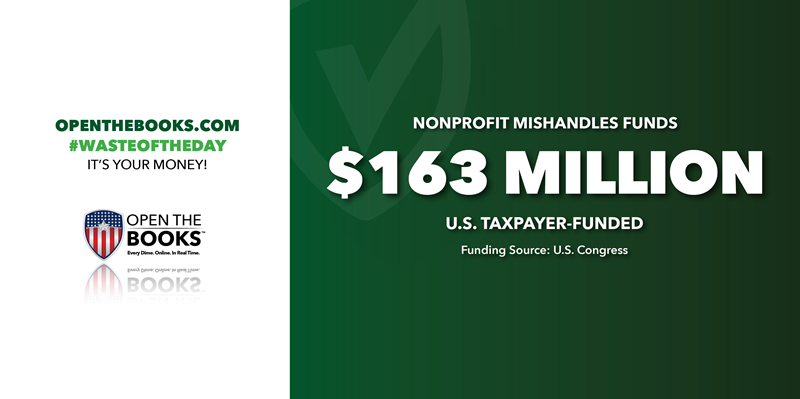
NeighborWorks America, a congressionally chartered nonprofit with a mission to revitalize neighborhoods, received $163 million from Congress in 2021, but mismanaged procurements and conflicts of interest, has an inadequate whistleblower policy, and didn’t fully meet audit standards, according to a Government Accountability Office report.
Congress created NeighborWorks America in 1978 to “create opportunities for people to live in affordable homes, improve their lives and strengthen their communities,” according to its website. It provides trainings, resources, financing, and other services to achieve these goals, and employs about 350 people.
Unfortunately, the GAO report found multiple areas of concern.
First, it found that staff did not consistently follow procurement procedures like obtaining transaction documentation and supervisory approval. This is likely because NeighborWorks doesn’t train its staff on its procedures, and changes them without notifying staff.
Because of this, GAO found 23 instances of acquisitions worth $100,000 or more with no documentation present, compared to 29 instances of acquisitions with documentation.
Its whistleblower policy is also problematic, lacking both procedures for investigating complaints and criteria for who will conduct investigations. Both are critical to ensuring violations of law and policy and misuse of taxpayer dollars are investigated appropriately.
Finally, in examining prior audits, GAO found it “has not fully met standards on quality assurance and improvement.” These standards are meant to assess the efficiency and effectiveness of its programs.
If taxpayers are giving this nonprofit $163 million, then NeighborWorks America needs to clean up its internal controls and management to ensure its operations are efficient and transparent.
At Least $403B Covid Aid Lost or Stolen
July 4, 2023
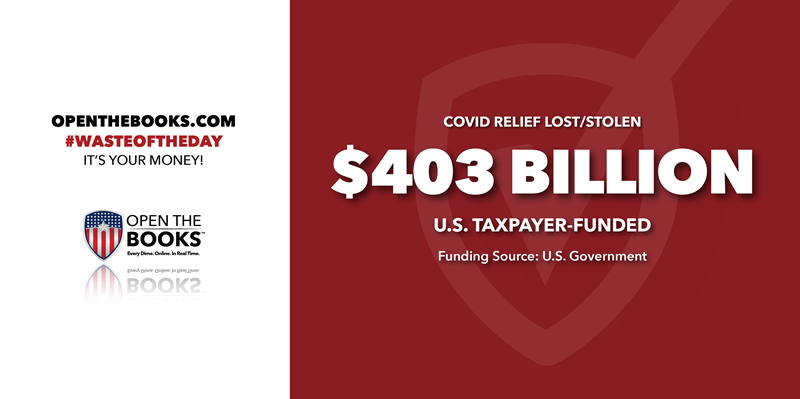
Fraudsters stole $280 billion in Covid relief funds, while another $123 billion was wasted or misspent, adding up to $403 billion in wasted Covid funds, or about 10% of total Covid related expenditures, according to a new report from The Associated Press.
For two years, our auditors at OpenTheBooks.com estimated the likely Covid-aid fraud at $500 billion.
The Covid relief funds came predominantly from programs like the Paycheck Protection Program, the CARES Act, and the American Rescue Plan Act, with total spending on Covid relief nearing about $4.2 trillion over about a three year period.
The money was sent out quickly, at the expense of oversight and verification, leading to lax oversight and rampant fraud.
“Here was this sort of endless pot of money that anyone could access,” Dan Fruchter, chief of the fraud and white-collar crime unit at the U.S. Attorney’s office in the Eastern District of Washington, told the AP.
The PPP was one of the most fraudulent programs, thanks to features like self-certification of loan applications that made falsifying identities easy. Other provisions also made oversight hard, like a CARES Act provision that barred the Small Business Administration from examining tax return transcripts that could have identified fraudulent activities.
Now, efforts to reclaim the money and hold the fraudsters accountable are slowly materializing, with the Department of Justice charging 2,230 defendants so far with pandemic-related fraud crimes, and with thousands of investigations ongoing. “It is an unprecedented amount of fraud,” Mike Galdo, the Justice Department’s acting director for COVID-19 Fraud Enforcement, told AP
The federal government’s response to the pandemic amounted to one of the largest spending programs in U.S. history, and the government now needs to learn from its mistakes to ensure fraud and waste on this scale never happens again.
U.S. Spends $4.5M to Fight Wildlife Trafficking in Latin America
July 5, 2023
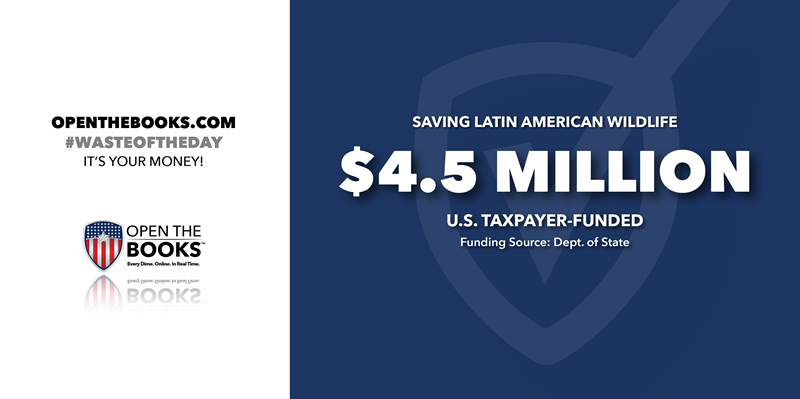
The State Department’s Bureau of International Narcotics and Law Enforcement Affairs will spend $4.5 million to counter wildlife trafficking in Latin America.
The bureau plans to award three grants between $750,000 and $3 million to different nonprofits to “support activities that counter wildlife trafficking in Latin America to disrupt the ability of transnational criminal networks to profit from wildlife crimes, reducing the threat to stability and security.”
The grant notice notes that Latin America is a hub for the criminal wildlife trade, with criminals exploiting weak borders and institutions to profit off this illicit trade, in turn threatening the rule of law, spreading diseases, and destabilizing communities.
To combat this, the bureau wants to fund projects that increase the disruption of illicit trade, strengthen investigative and enforcement functions, enhance prosecutorial and judicial capacity, and develop international law enforcement coordination and information sharing.
While combating wildlife trafficking may be a laudable goal, the beneficiaries of this project are solely Latin American citizens. This grant does not stop wildlife trafficking within the U.S., instead opting to strengthen law enforcement capabilities in other countries.
The U.S. has enough fiscal problems providing basic services like Social Security, Medicare, infrastructure, and education. It simply can’t afford to fund pet projects to solve every ill in every corner of the globe.
Throwback Thursday: FAA Wasted $135 Million On Vacant Land
July 6, 2023
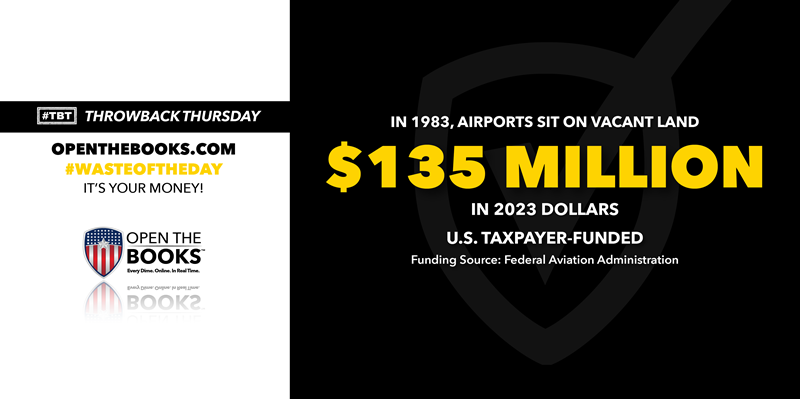
Throwback Thursday!
In 1985, the Federal Aviation Administration wasted $48 million – about $135 million in 2023 dollars – by letting Florida airports allow valuable land to sit idle, while leasing other land for below market prices.
Sen. William Proxmire, a Democrat from Wisconsin, awarded the FAA his Golden Fleece Award for this financial malpractice.
According to Proxmire, a policy of allowing small airports to use surplus federal land and buildings began in 1944. The policy was meant to help up-and-coming airports pay their operating costs under the supervision of the FAA.
Unfortunately, Florida airports began accumulating land without a clear use for it. By 1985, 23 Florida airports had accumulated 9,300 acres of unused government property worth $32 million per year that could have been leased for a profit.
On the land these airports did lease, they did so at below-market rates. In one case, an airport leased out 417 acres for use as a golf course and stables. The market rate was $14,000 per acre, but the airport charged only $240 an acre. In another example, land was rented to a speedway at $11 per acre while fair market value was $8,000 an acre.
While airports lost millions on the rentals, the 23 airports involved in this boondoggle received $112 million in federal grants, Proxmire found.
Beneficiaries of special government benefits like airports have a responsibility to ensure taxpayers’ money and assets are being used wisely, and the government must ensure strong oversight is in place so bad deals like this don’t happen.
U.S. Had $247 Billion in Improper Payments in 2022
July 7, 2023
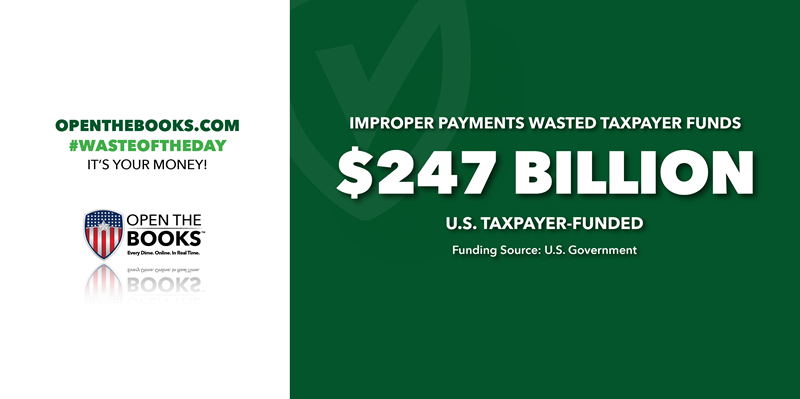
In fiscal year 2022, the federal government made a whopping $247 billion in improper payments, down from $281 billion in 2021, but still the second highest gross amount and rate on record.
OpenTheBooks analyzed this wasteful spending in a new report and found the worst programs were Department of Health and Human Services’ Medicaid ($81 billion); HHS’s Medicare — consisting of several parts — ($47 billion); and Small Business Administration’s Paycheck Protection Program ($29 billion).
In 2021, the SBA overpaid $671 million in improper payments but that number ballooned to $37.3 billion in 2022, due mostly to the PPP and COVID-Economic Injury Disaster Loan program — $35.9 billion combined.
Dead people received $532.5 million in 2022 and $441.7 million in 2021 in mistaken payments, including federal pensions, disability insurance, and Social Security.
In 2009, an Executive Order created PaymentAccuracy.gov, a website to track all improper payments made by the federal government, with data going back to 2015.
An improper payment is defined as “a payment that should not have been made or that was made in the wrong amount. That includes overpayments, underpayments, or even payments made to the right recipient in the right amount but not in strict adherence to the relevant statute or regulation.”
In examining programs, federal programs were rated as “high priority” in 2022 if their improper payments exceed $100 million per year. Many agencies on the list have had “high priority” programs multiple years in a row.
It’s appalling that the federal government continues to make hundreds of billions in improper payments each year with little to no oversight. If a business made those improper payments, they wouldn’t stay in business long. Government, however, gets away with it year after year.
The #WasteOfTheDay is presented by the forensic auditors at OpenTheBooks.com.